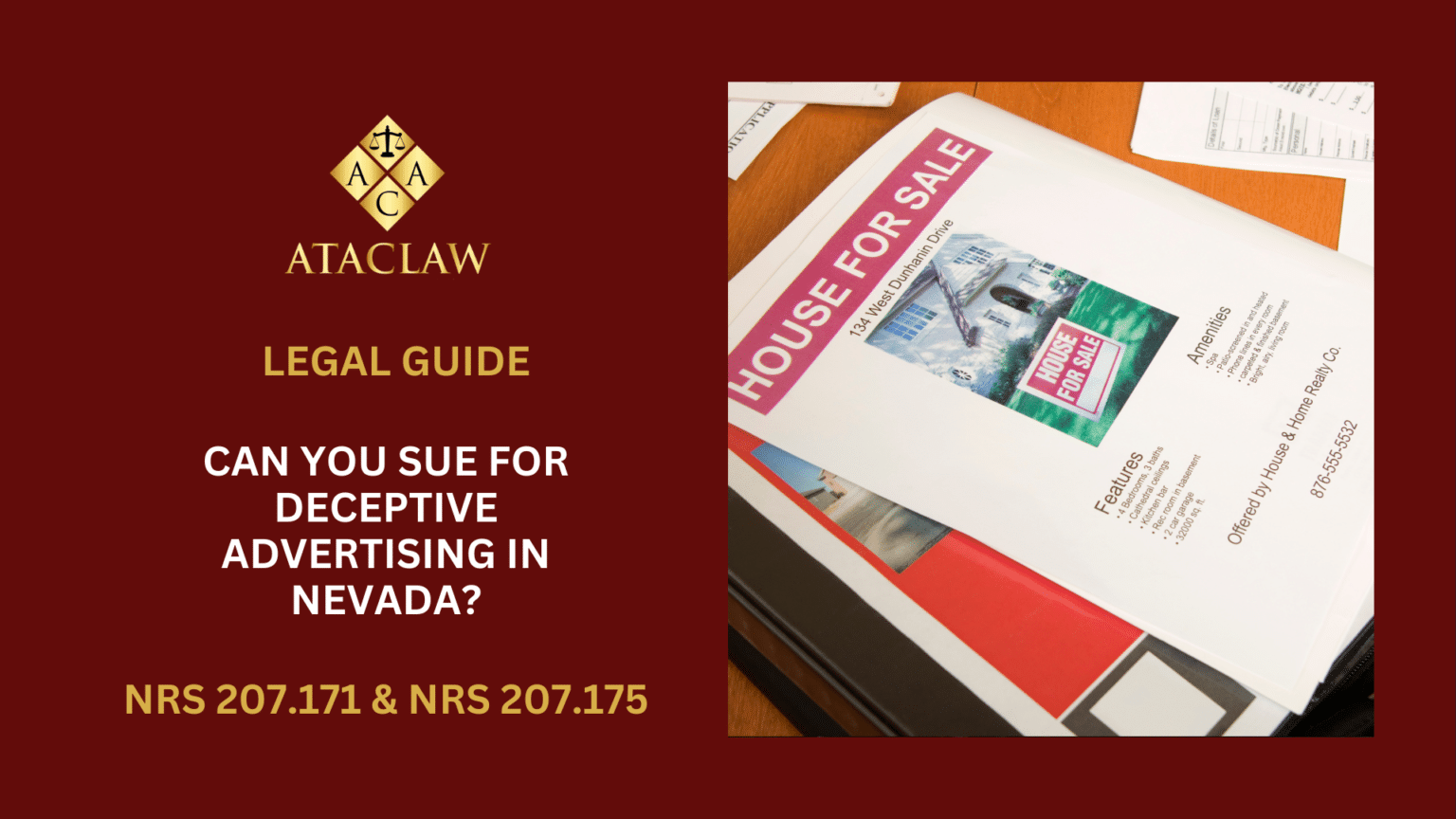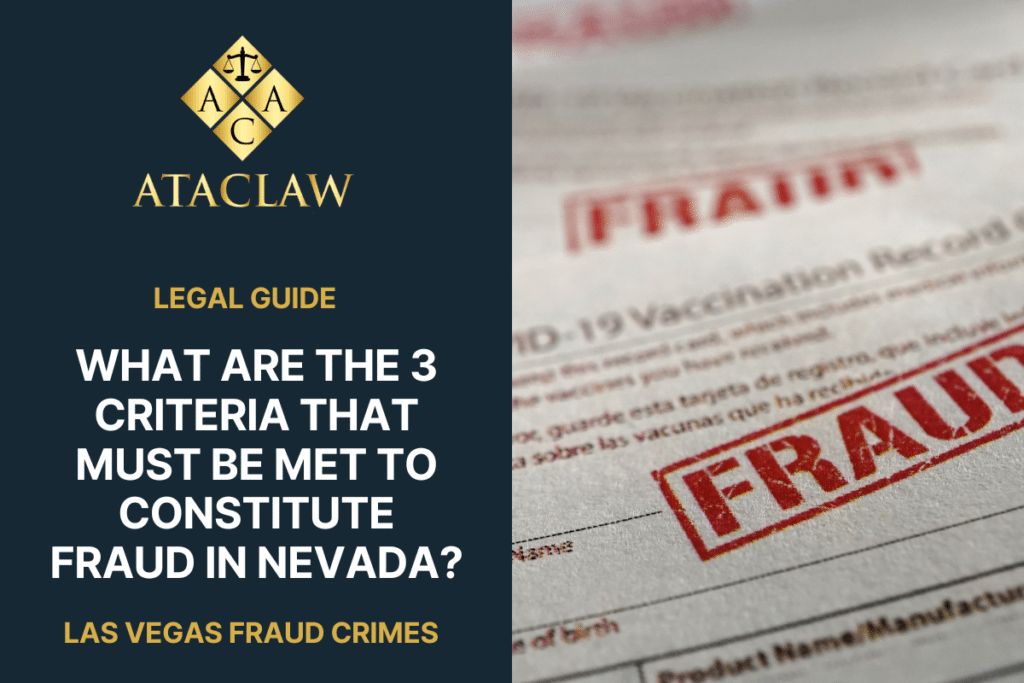In Nevada, the fine line between persuasive advertising and deceptive practices can sometimes blur. Nevada takes a firm stand against misleading advertisements through two key statutes: NRS 207.171 and NRS 207.175. Misleading or false advertising not only erodes consumer trust but is also considered a crime under Nevada law – regardless of whether the deceptive ad caused someone to suffer a loss or not.
Under NRS 207.171, it’s unlawful for businesses or individuals to engage in false advertising. This includes publishing, disseminating, or displaying—either directly or indirectly—any false, deceptive, or misleading statements through various mediums. The law aims to protect consumers from being induced into transactions based on incorrect information concerning the sale, lease, or acquisition of goods, services, or properties.
Violations of these standards are met with strict penalties. For starters, a first or second offense under NRS 207.175 is considered a misdemeanor, potentially leading to six months in jail and/or a fine of up to $1,000. Any subsequent offenses graduate to gross misdemeanors, with penalties ramping up to 364 days in jail and/or fines up to $2,000. These escalating repercussions underscore Nevada’s zero-tolerance policy towards repetitive deceptive advertising practices.
Can You Spot Deceptive Advertising in Nevada?
Ever wonder what counts as deceptive advertising in Nevada? You’re not alone. Many of us are bombarded with ads daily, but there’s a fine line between an eye-catching promotion and one that’s legally shady. In its simplest form, deceptive advertising is when someone uses false or misleading statements in any kind of ad to convince you to engage in a transaction. Think of it as falsely labeling a price tag in a flashy brochure – not cool, right?
Here in Nevada, the rules against deceptive advertising don’t play favorites; they apply across the board. Whether it’s a TV spot, a catchy jingle on the radio, those glossy magazine ads, digital banners on your favorite website, or even a persuasive chat by a salesperson – if it’s misleading, it’s a no-go.
Dialing deeper into telemarketing, there’s an extra layer to consider. Ever get a call that feels like a friendly chat, only to discover it’s a sales pitch? If that initial “heads up, this is a sales call” is missing, it dips into deceptive territory. And yes, even without a single fib being told. It’s important to highlight that in Nevada, every, yes every, instance of deceptive advertisement is treated as its own unique offense. Even if it’s the same misleading message spread across town.
- For instance, if Alex approaches different folks, trying to sell them a high-end watch at a too-good-to-be-true price, each misleading pitch could land Alex a new charge.
Heading up the corporate ladder, accountability doesn’t just end with the marketing team. If the big bosses, you know, the ones in the fancy offices, knew about these misleading advertisements and did nothing, they could find themselves in hot water too.
So, why does this matter to someone like you or me? Knowledge is power, especially in a world where advertisements are everywhere, trying to grab our attention (and wallet). Being aware means you’re better equipped to spot these tactics and protect yourself from misleading claims.
What’s the Cost of Deceptive Advertising in Nevada?
When it comes to advertising in Nevada, honesty is more than just the best policy—it’s the law. The state cracks down on false advertising, and if you’re caught, you could be looking at more than just a slap on the wrist. Let’s unpack what’s at stake.
- For starters, a standard case of deceptive advertising can land you a misdemeanor charge. This could mean spending up to half a year in the local lockup and potentially forking over a grand in fines. On top of that, you might be hit with a civil penalty reaching $2,500.
- Now, if it’s not your first rodeo and you’re caught pulling a fast one for the third time (or more), things get real serious, real fast. This bumps you up to the gross misdemeanor league, with possible jail time of up to 364 days and fines up to $2,000. And guess what? That civil penalty of $2,500 still looms.
But the legal tango doesn’t end there. The District Attorney or Nevada Attorney General holds the card to play an injunction to halt any shady advertising practices. If you cross the line and ignore this order, you’re back to facing gross misdemeanor penalties—oh yes, think nearly a year in jail and another couple thousand in fines. And it’s not just Nevada keeping eyes on you. The Nevada Consumer Affairs Division, the Better Business Bureau, and even the big guns at the Federal Trade Commission could have you on their radar, which could mean serious business blues, like losing your license to operate.
A bit overwhelming? That’s where we come in. At ATAC LAW, we believe in making sure you’re equipped with the knowledge to navigate these murky waters—or better yet, to avoid them altogether. Keep it above board, and you keep your peace of mind. And should you ever find yourself in a pinch, remember we’re here to help guide you out, every step of the way.
How Can I Defend My Business Against Deceptive Advertising Charges?
So, you’ve got a bit of a situation on your hands with deceptive advertising charges? No need to hit the panic button. Here, we’ll walk you through a couple of savvy defenses that have worked for many business owners, just like you. And remember, at ATAC LAW, we’re all about keeping things straightforward and stress-free.
- Was the Ad Actually True?
Here’s the thing: in the eyes of Nevada’s law, it’s all about whether your ad could potentially mislead the public. This standard is pretty open to interpretation, making it somewhat of a gray area. If it comes down to it, and there’s no solid proof that you deliberately fibbed or misled in your advertising, then as far as the law is concerned, you haven’t crossed the line into the land of criminal activity. It’s all about what can be proven, and if there’s reasonable doubt that your ad was misinterpreted rather than flat-out deceptive, you might just have your golden ticket. - Did You Make an Honest Mistake?
Now, onto the second point of defense – good faith. Say your ad did contain an error, but it was a genuine mistake or an oversight. If you can demonstrate that there was no intention to deceive or mislead, that’s a significant point in your favor. Everybody makes mistakes, and the law understands that. The crux here is proving that any misstep was without malice or knowledge of the mistake at the time the ad was made.
One thing to note, though: the fact that no one was actually deceived or harmed by the ad doesn’t really come into play when defending against these charges. It’s all about the intention and the potential for the ad to mislead.
Is It Possible to Seal My Criminal Record for Deceptive Advertising?
Absolutely, you’ve got options for a fresh start. Let’s talk sealing records—think of it like putting your past misstep in a vault. If you’ve had a run-in with a misdemeanor related to deceptive advertising, hang tight for one year after wrapping up your case and you’re eligible to seek a record seal. For a gross misdemeanor, the waiting period is two years post-case conclusion.
And get this: if your case was dismissed, there’s no need to watch the calendar. You can go ahead and seek a record seal without delay. Keeping it simple, ATAC LAW is here to help you navigate the process of sealing your Nevada criminal record. Consider us your guide towards clearing the slate.
For further legal assistance and to discuss your case with an expert, don’t hesitate to contact ATAC LAW.




